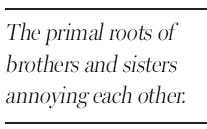Siblings, in love and war
Updated: 2011-10-09 07:56
By Kevin Delaney(The New York Times)
|
|||||||
"I think Ray has been happy for only three years in his life. And those were the three years before I was born."
So said Dave Davies about his brother, Kinks bandmate and lifelong sparring partner, Ray.

The famously fractious British rockers are trapped in a family dynamic that has been explored everywhere from Shakespeare to The Simpsons: sibling rivalry. And even though there is more to siblings than resentment, bullying and, in the case of the Davies brothers, onstage punch-outs, bad behavior remains a good place to start.
Studies show that young siblings fight approximately every 17 minutes. And as Jeffrey Kluger writes in "The Sibling Effect: Brothers, Sisters and the Bonds That Define Us," the rough-and-tumble world of siblings is now being seen as a primary factor in shaping personality. Previous research focused on parents, DNA and socioeconomics.
As Mr. Kluger writes: "Our spouses arrive comparatively late in our lives; our parents eventually leave us. Our siblings may be the only people who truly qualify as partners for life."
The sibling dynamic may be rooted in the primal competition for parents' limited resources, whether physical or emotional. Mr. Kluger cites research claiming that 65 percent of mothers and 70 percent of fathers show a preference for one child. Usually, that is the oldest.
Katherine Conger, a sociologist at the University of California, Davis, who led that study, told Mr. Kluger that the second-tier children "tend to be sadder and have more self-esteem questions."
Yet, reviewing Mr. Kluger's book in The Times, Alison and Adam Gopnik stressed that middle siblings can be more diplomatic than their bossy older siblings, a valuable life skill.
And observing family drama can turn youngest siblings into scathing satirists. "Like little baby brother Voltaire," the Gopniks wrote.

Younger siblings may also be less averse to risk, behavior that may have arisen in the primordial struggle for food and survival. As The Times reported, the social scientists Frank J. Sulloway and Richard L. Zweigenhaft examined the statistics of baseball-playing brothers and focused on riskier plays, like stealing bases.
The scientists found that more than 90 percent of the time the younger brother stole more bases.
When it comes to blue-footed boobies, however, the bullying that older siblings dish out does not appear to have lifelong consequences. The Times reported that though the older birds peck their younger siblings into submission in the nest - leaving the smaller birds with less food and higher levels of stress hormones - as adults, the younger siblings are just as aggressive in defending their own nests.
In humans, aggressive pecking often evolves into loving adult connections, researchers say.
And sibling strife teaches that even seemingly intractable conflicts can be resolved.
Another rock act, the Allman Brothers Band, diverged from the Kinks model. Gregg Allman and his big brother Duane fought incessantly as children. As adults they forged a deep love and an almost mystical musical bond that continued even after Duane's death in 1971.
"Every time I walk up on the stage," said Gregg, "I still feel like he's standing right there next to me."
For comments, write to nytweekly@nytimes.com.
(China Daily 10/09/2011 page9)